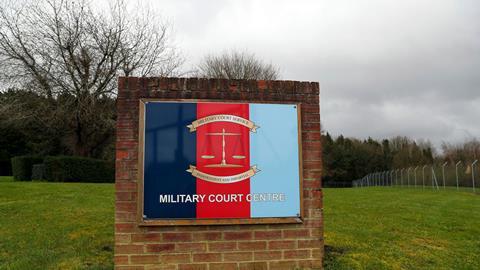Rarely a week goes by without a headline documenting a case of sexual harassment or assault in the armed forces.
In recent years we have seen scandals in every walk of military life, from the Red Arrows to the submariners. The common theme is women being subjected to the type of behaviour that would not be tolerated, or even contemplated, in any other workplace. Yet report after report has detailed just how pervasive this behaviour is and also how frequently a blind eye is turned.

Most shocking and perhaps not widely known is that the armed forces operate their own judiciary – known as the Service Justice System – to investigate and prosecute serious crimes including rape and sexual assault. Under this system, cases are tried before a board of military personnel who act as the jury. While military personnel chosen for the board are selected randomly across the services, this does not mean that these individuals may not be influenced in their decisions by upcoming promotional boards or future posting requests. They are making decisions that effectively impact their direct employer: the military.
It has long been known that service personnel accused of rape and sexual assault are far less likely to be found guilty in a court-martial compared to the civilian criminal courts.
Fewer than a quarter (23%) of the 93 rape cases heard in courts-martial between January 2018 and April 2024 resulted in a guilty verdict. This compares to an average 70% conviction rate for rape cases heard in civilian courts.
This is not an issue restricted to women. Recent reporting has highlighted the sexual abuse of men subjected to vile and degrading initiation ceremonies. Such incidents are not always reported and securing a conviction can be incredibly challenging, particularly when forensic evidence may not meet the standard we would expect when crimes are investigated in the civilian system. The trauma this causes for often young or vulnerable individuals is devastating. There is in fact a double trauma of having experienced an assault and then being subjected to a miscarriage of justice when a crime goes unpunished.
This system has gone more or less unchallenged despite regular calls for change and recommendations that all serious crimes including murder, manslaughter, rape, sexual assault, domestic and child abuse cases should fall under the civilian justice system. Such recommendations appear to have fallen on deaf ears.
That is not to say that no action has been taken. A zero-tolerance policy on unacceptable sexual behaviour was introduced in 2022 as part of the Ministry of Defence’s response to the 2021 Defence Sub-Committee on Women in the Armed Forces report, which detailed extensively the MoD’s failure to protect female personnel. That report found that 64% of female veterans and 58% of current female personnel had been subjected to bullying, harassment or discrimination during their careers.
However, we know from speaking to service personnel that the policy is not being correctly implemented. Victims and survivors of sexual harassment and assault are often penalised for reporting these incidents, finding themselves ostracised and accused of lying or of having ulterior motives for reporting. It would appear that such policies are a neat way of papering over the cracks or paying lip service rather than being a force for meaningful change.
From the perspective of lawyers bringing civil claims, potential claimants are disadvantaged when incidents are not properly investigated to allow either disciplinary action to be taken or to secure a conviction. This omission means the evidence is often not there to prove what happened. In consequence the MoD can escape accountability where it has failed to implement its own policies and not prioritised the victims of crime over the perpetrators.
Sometimes it will be too late to remedy what has happened in criminal proceedings, but it is always essential to press for the disclosure of documents relating to the police investigation: including statements, court-martial transcripts, sentencing remarks and anything that can be used in evidence. Where you have the opportunity for earlier intervention, then a claimant should be encouraged to make sure the correct allegations are being pursued and that nothing untoward is being done either to water down allegations or only to pursue a prosecution on minor charges.
What we know anecdotally and from the statistics available is that the Service Justice System cannot be trusted to properly investigate serious crimes such as sexual assault and rape. These crimes should be investigated and prosecuted by an independent and impartial prosecutorial system. This process should be made unequivocal and not open to interpretation, which is what we have under the current system (it does allow for crimes to be passed to the civilian justice system, although this seems rarely if ever to happen in practice).
This type of justice reform is seriously overdue. We would encourage the government to treat this as an urgent priority as part of a wider package of reform. This would build on its commitment to improve service life, as manifested by the recent introduction of the Armed Forces Commissioner Bill, which in part is intended to tackle some of the longstanding deficiencies of the service complaints process. It is beyond comprehension that the current system should be allowed to continue when it is so fundamentally failing our service personnel.
Hannah Swarbrick is a senior associate in the military claims team at Bolt Burdon Kemp, London
































No comments yet